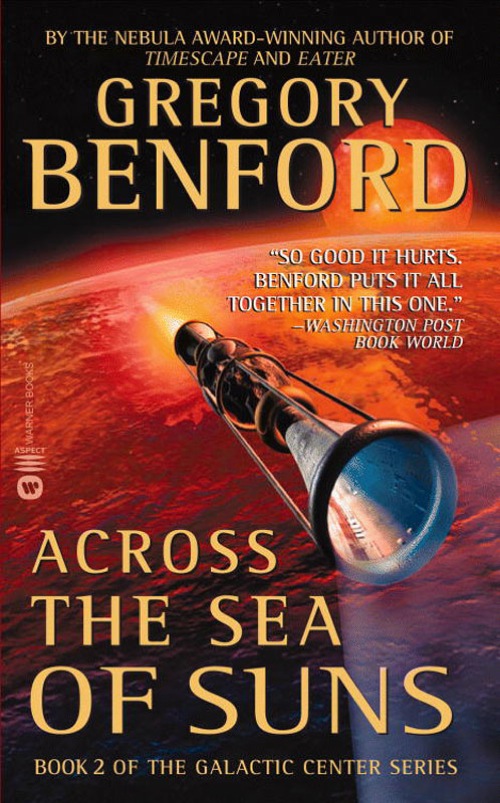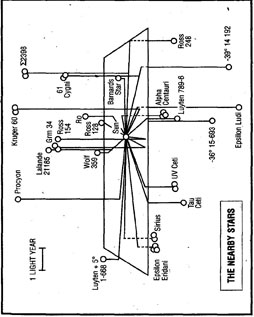Across the Sea of Suns


Copyright © 1984 by Gregory Benford
All rights reserved. No part of this book may be reproduced in any form or by any electronic or mechanical means, including information storage and retrieval systems, without permission in writing from the publisher, except by a reviewer who may quote brief passages in a review.
Warner Books
Hachette Book Group
237 Park Avenue, New York, NY 10017
Visit our Web site at
www.HachetteBookGroup.com
The Aspect name and logo are registered trademarks of Hachette Book Group.
First eBook Edition: March 2004
ISBN: 978-0-446-50634-2
Contents
PART FIVE: 2080 INTERSTELLAR SPACE BETWEEN RA AND ROSS
THE WATCHER
The crew standing near the Watcher’s entrance hole stopped speaking, forever. A millisecond-stepped scan of the video readback showed only a blue-white fog, and then—next frame—the beginnings of an orange explosion. In two more frames the boiling orange had reached the video lens itself and transmission stopped. The orange moved like a liquid, licking the surface of the satellite clean in seven milliseconds. A tongue of it projected eighteen klicks toward the orbiting mission team for twenty-two milliseconds. Then two-thirds of the crew—all that were on the satellite—were dead.
ACCLAIM FOR GREGORY BENFORD’S CLASSIC NOVELS OF THE GALACTIC CENTER
IN THE OCEAN OF NIGHT
“A major novel.”
—Magazine of Fantasy & Science Fiction
“A brilliant book, a weathervane for the changing winds of science fiction.”
—Publishers Weekly
GREAT SKY RIVER
“A challenging, pace-setting work of hard science fiction that should not be missed.”
— Los Angeles Times
“Overwhelming power … irresistible strength.”
—Washington Post Book World
ALSO BY GREGORY BENFORD
Fiction
The Martian Race
Eater
The Stars in Shroud
Jupiter Project
Shiva Descending
(with William Rostler)
Heart of the Comet
(with David Brin)
A Darker Geometry
(with Mark O. Martin)
Beyond the Fall of Night
(with Arthur C. Clarke)
Against Infinity
Cosm
Foundation’s Fear
Artifact
Timescape
The Galactic Center Series
In the Ocean of Night
Across the Sea of Suns
Great Sky River
Tides of Light
Furious Gulf
Sailing Bright Eternity
Non-fiction
Deep Time: How Humanity Communicates
Across Millennia
To David Hartwell

After the final no there comes a yes.
And on that yes the future world depends.
No was the night. Yes is this present sun.
—
WALLACE STEVENS
2076 RA
F
ire boils aft, pushing the ship close to the knife edge of light speed. Its magnetic throats dimple the smooth dipolar field.
—An arrow scratching across the black—
—blue-white exhaust plume of fizzing hydrogen—
—a granite-gray asteroid riding the roaring blowtorch—
It sucks in the interstellar dust. Mixes a caldron of isotopes. And spews them out the back, an ultraviolet flare in the swallowing abyss.
Inside, Nigel Walmsley was eating oysters.
The last of the wine,
he thought moodily, peering into his cup. And it was. As nearly as ship’s rumor had it, nobody else had brought more than a bottle or so, and that had been well exhausted in the last two years.
He swirled the cup and swallowed the final chilled mouthful. The Pinot Chardonnay cut the faintly metallic taste of the oysters and left only the sea flavor and the succulent texture, a memory of Earth. He drank the last cold liquid from the shells and savored it. Eight light-years from Earth, the echo of the Gulf Stream faded.
“That’s the lot,” Nigel murmured.
“Uh … what?”
He realized he had been neglecting his guest. Ted had arrived unannounced, after all, and dead on the supper hour, as well. “I doubt I’ll be able to replace California Chardonnay, and certainly not oysters.”
“Oh. No, I suppose not. Are … are you sure the oysters were still okay?” Ted Landon shifted awkwardly.
“Considering they’ve been vac-stored for years, you mean?” Nigel shrugged. “We’ll see.” He lounged back on the tatami mat, nearly elbowing a lacquered lamp into oblivion. His nudity clearly bothered Ted. The man moved again, adjusting his cross-legged sitting position. Well, so be it; Nigel hadn’t had time yet to run out some chairs in the wood shop.
Ted’s tobacco pouch appeared. “Mind?” Nigel shook his head. During meals, he did, yes, but Ted probably knew that already. He knew everything. They had a personality profile on Nigel a yard long, even in ferrite storage. He’d seen it himself.
A slow, profound stuffing of the pipe. “Y’know, when I heard you were carving an apartment in the Low Amenity Area, I thought you’d be living pretty raw. But this looks great.”
Nigel nodded and studied the living room, trying to see it with Ted’s eyes.
—crimson vase, pale yellow flower sprouting, tray cupping single flake of smoldering incense, teakwood box, gossamer paper walls, oblique blades of yellow light drawing motes upward in the fanned air—wait until Ted had to excrete and found the loo, a hole lined with porcelain straight from Korea, closed with a wooden cover, on either side stepping-stones in the shape of feet for the slow learners: squat and deliver, why put a mask on a valuable moment of the day—
“What gives?” Nigel asked, lapsing into transatlantic shorthand.
Ted looked at him flatly, still slightly edgy. “I’m reorganizing staff.”
Aha. “You’re the new Works Manager.”
“That’s not the term, but—look, Nigel, there are some hard choices.”
“Indeed.”
Ted gave a smile, reassuring and broad but capable of vanishing, along with the flicker of one eyelid, as suddenly as it had come.
“You’ve been an ExOp so far.”
“Gridded, yes.” Nigel was too old to do the work directly, with his own muscle power. But his coordination and reflexes, enhanced by constant medservice, were still good. So they linked him by grid into servo’d robots that operated outside the ship.
“Well, y’see, there’s a big waiting list for that job classification. And you’re …”
“Too old,” Nigel said bluntly.
“Well, a lot of people think so. When the community vote came in—the vote on who’ll do what in Isis space—you got a lot of red flags.”
“Not surprising.”
“So I’m here to ask you to resign. Drop out of ExOp.”
“No.”
“What?”
Surely it couldn’t have been that difficult to follow. “No.”
“But community votes are pretty near binding.”
“No, they’re merely indicative. My fellow crewmen can’t give me the sack,
zip,
like that.
You’re
the command structure, Ted. Surely you know you can overrule anything short of an absolute majority in the community.”
“Well—”
“And with 1266 voting, I doubt a majority wanted me out of my slot. Most don’t know my work, or care.”
Ted had a small habit. He braced his jaw a bit and tightened his mouth, so slightly that Nigel could scarcely see the pressure whiten the red of his lips. Then he touched his front teeth together and rubbed them carefully back and forth, as though he were methodically sharpening them against each other. His jaw muscles rippled.
“Technically, Nigel, you’re right.”
“Fine, then.”
“But your sense of community must lead you to see that active opposition by a significant minority is, well, contrary to the long-term interests of our mission and—”
“Bloody hell!”
Again Ted made his teeth-sharpening motion, jaw muscles flexing. “The alternative job I think you’ll find quite attractive.”
“What is it?”
“Heavy foundry work.”
Fusing the asteroid rock, prestressing struts, using laser cutters and e-beams. “Socketed?”
“Uh, yes, of course.”
They hooked you into the big machines, connected you at hip and knee and elbow and wrist, the delicate electronic interface matching directly to your nerves. And you sensed the machine, you felt the machine, you worked the machine, you served the machine, you were the machine. “No.”
“You’ve been using that word a lot lately, Nigel.”
“It’s terribly economical.”
Ted sighed—spontaneous, or calculated? Hard to tell—and clapped his big hands to his knees. The zazen position was uncomfortable for him, even with his shoes off. For some reason most guests adopted that position, even though Nigel usually sprawled on the cushions. Perhaps they felt the rectangular simplicity of this Oriental room suggested a spine-straightening discipline to its inhabitants. To Nigel it suggested just the opposite.
“Nigel, I know you won’t like leaving external operations, but I think after you made the switch to foundry work, you’d feel—”
“Like a canceled stamp.”
Ted’s face reddened suddenly. “Damn it, I expect sacrifice from everyone on board! When I ask you to change jobs, elementary—”
Nigel waved him to silence. He had found that a particularly abrupt gesture, ending in a thrust forefinger, nearly always stopped Ted’s rapid-fire attacks. A valuable trick. “And if I don’t comply? The Slowslots?”
This had the intended effect. Dragging the Slowslots suddenly to stage center raised the stakes. This in turn disturbed the controlled way administrators liked to negotiate, and also brought floating to Ted’s mind the fact that Nigel had helped develop the Slowslots as a volunteer guinea pig; he had already paid dues that were more than metaphorical.
“Nigel …” Ted drawled, shaking his head soberly. “I’m surprised you would think in those terms. No one in the
Lancer
community wants to stick you into a sleep box. Your friends are simply trying to tell you that perhaps it is time to step aside from the tasks that require reflexes, skill, and stamina which—let’s face the facts—you’re gradually losing. We all—”
“Right. In other words, they’ve always seen my appointment to a real, working exo job as a political fish thrown to a 3-D-elevated seal.”
